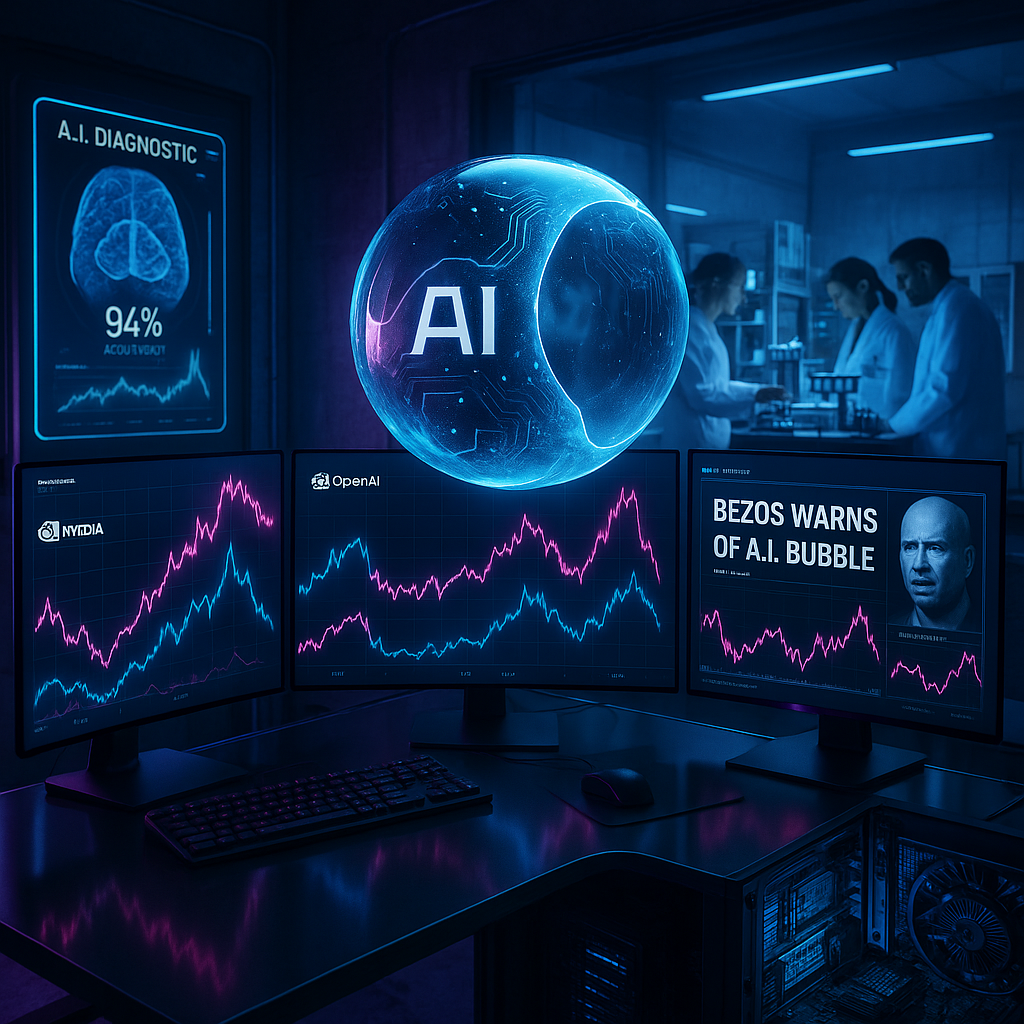Key Takeaways
- Jeff Bezos warns of speculative excess in AI investment but stresses artificial intelligence’s lasting societal benefits.
- AI news this week highlights developments in health, politics, and mental health influenced by AI technology.
- The White House faces scrutiny for its defense of AI-generated deepfakes used by former President Trump during government shutdown debates.
- Breakthrough AI tools are transforming personalized cancer diagnostics, with potential to redefine standards of care.
- New research finds AI-powered mental health apps actively influence users’ emotional processing, not just provide support.
- The day’s review covers pressing intersections of ethics, politics, healthcare innovation, and the evolving emotional landscape.
Introduction
On 4 October 2025, Jeff Bezos issued a sharp warning about an overheating surge in AI investment. He emphasized both the alluring volatility and the profound societal promise of this technology. This week’s AI news review explores the interplay between transformative developments, such as new AI-driven cancer diagnostics, and the wider ethical and political debates shaping global discourse.
Top Story
Bezos Issues Warning on AI Investment Bubble
Jeff Bezos cautioned about the existence of an “AI investment bubble” during his keynote address at the Stanford Technology Forum. He cited unsustainable valuations among early-stage AI companies. Despite recognizing artificial intelligence as a genuine technological revolution, Bezos suggested current market enthusiasm may be outpacing realistic near-term capabilities.
At the same time, Bezos expressed strong optimism for the long-term, transformative potential of AI. In particular, he noted advances in healthcare diagnostics and climate modeling as examples where AI is delivering real value beyond speculation.
Market analysts stated these remarks reflect growing concerns in the tech sector regarding a mismatch between funding and practical application of AI. Venture capital firms are reportedly applying stricter evaluation criteria for AI startups, emphasizing proven use cases over theoretical potential.
Stay Sharp. Stay Ahead.
Join our Telegram Channel for exclusive content, real insights,
engage with us and other members and get access to
insider updates, early news and top insights.
 Join the Channel
Join the Channel
Also Today
AI Ethics and Governance
The International AI Policy Coalition released a comprehensive framework for global AI safety standards, in agreement with 27 nations. This document establishes baseline requirements for transparency and accountability in AI systems that operate across international borders.
As debates around the philosophical foundations of artificial intelligence continue, global policymakers are increasingly focused on the need for shared ethical guidelines and international cooperation to manage transformative technologies.
Healthcare AI Breakthrough
Researchers at Stanford Medical Center demonstrated a new AI diagnostic system reaching 94 percent accuracy in early-stage cancer detection. Published in Nature Medicine, the study showed that the system matched or exceeded human pathologists’ performance while reducing analysis times.
Also Today
AI Education Initiatives
Major technical universities have announced updated computer science curricula that integrate expanded coverage of AI ethics and safety. The change responds to industry calls for graduates with a blend of technical skills and ethical awareness.
Stanford, MIT, and Carnegie Mellon plan to implement the new curricula beginning in January 2026. Programs will incorporate practical experience with AI systems and include philosophical and sociological components.
Interest is also growing in the broader context of how algorithms shape collective digital memory, highlighting the need for educational frameworks that address both technical fluency and cultural impact.
Also Today
Industry Developments
Leading technology companies have detailed significant expansions of their AI research operations. Google and Microsoft each committed over $2 billion to new laboratories focused on fundamental AI research rather than immediate commercial use.
The expansion initiatives involve partnerships with academic institutions and aim to facilitate public access to research. Executives emphasized the importance of a collaborative approach to AI development.
These collaborative efforts echo advancements in neuroplasticity and intelligent feedback systems, as interdisciplinary research shapes the next wave of AI innovation.
Market Wrap
Tech Sector Response
AI-related technology stocks showed mixed performance after Jeff Bezos’s comments. Established companies with significant AI investments remained stable. In contrast, speculative AI startups experienced greater volatility.
The semiconductor industry reported gains due to strong demand forecasts for AI-specific computing hardware. Cloud service providers saw increased usage of AI-driven services.
This market activity coincides with a surge in projects exploring advanced AI hardware infrastructure and supercomputing platforms supporting large-scale model training and deployment.
What to Watch
- 15 October 2025: Global AI Safety Symposium in Geneva.
- 20 October 2025: U.S. Congressional Hearing on AI Regulation.
- 25 October 2025: International AI Ethics Summit in Singapore.
Conclusion
Jeff Bezos’s call for restraint amid soaring AI valuations anchors this AI news weekly review, highlighting tensions between market excitement and enduring societal impact. Developments in global governance, cancer diagnostics, and ethical education demonstrate the real-world effects of AI that extend beyond market fluctuations. What to watch: Global AI Safety Symposium on 15 October, Congressional hearing on AI regulation on 20 October, and the International AI Ethics Summit on 25 October.
For a deeper exploration of this week’s themes, see our coverage on AI chatbots supporting mental health in urban environments and the evolving ethical landscape of autonomous systems worldwide.





Leave a Reply